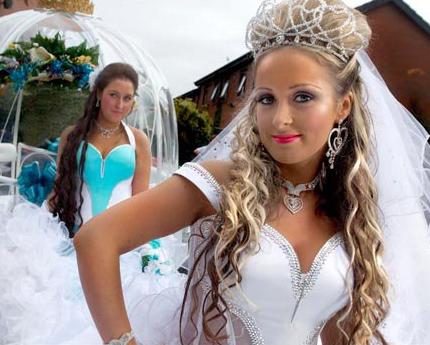A mocking kind of documentary

The realities of life for Travellers are too boring for tabloid TV. By Rosaleen McDonagh.
As an aunt of many nieces, some of whom are getting married this summer, watching Channel 4’s My Big Fat Gypsy Wedding has its own resonance. Sitting on the sofa with ten young beoirs (young women ) between the ages of 7 to 17, creates a sense of embarrassment, some anger and internalised shame.
“Do we know the beoir that’s getting married?” “Who are their family? How much freedom do they have compared to us? Are they made go to school the way we are?” The dresses, some of the comments: “Nah. I wouldn’t wear that yoke. Too big and too awkward. The sequins and the diamonds - I’d rather have something that I could show off for more than one day.” Comments about the bridesmaids’ dresses: “We all don’t wear them.” A 15-year-old: “The peer pressure to dress like that is unbelievable, it’s the boys, the young feins. They’re told if beoirs are not dolled up this way, they’re not worth looking at.” Another comment from a 17-year-old: “My wedding is in June. My dress is old-fashioned. Mammy is helping me make it. People are going to get a shock because I won’t wear a hoop but it’s not that kind of dress. Does that mean I’m not a real Traveller or it won’t be a real Travellers’ wedding?” From a 12-year-old: “She’s getting married - my sister - in five months and Daddy can’t get a hotel. If we were settled, that hotel would have been booked a year ago.”
The overall presentation is very much a distortion of the reality of our everyday lives. Like most of the population, weddings in families are a very excitable affair. They don’t happen every day or every week or even every year, so of course a wedding is a great occasion. The preparation and organisation for such a day is top priority for most families, and in particular the bride-to-be. Again, nothing unusual. The excitement and the build-up to such an event is palpitating. In the same breath, going to school with them to get the results of their GCSE or Leaving Cert exams is equally as palpitating, but that doesn’t really make a good story. Nor does the story that Traveller women die 11.5 years earlier than settled women or that two thirds leave school before the age of 15. This story is probably too real to make and too hard to watch.
These young beoirs (Traveller women) on the programme have had very little opportunity by way of educational prospects. Gender roles within the family and the wider Traveller community are so narrowly defined that criticising the beoirs in My Big Fat Gypsy Wedding is unfair.
Like all tabloid telly, it needs to be flashy, tacky and quick. A narrator whose voice comes across as evocative and sensationalist, a camera angle that’s constantly positioned on young Traveller females’ breasts and bottoms, would seem very sexist in the making of a television documentary. Or as we Travellers like to call it, a “mockumentary”. It would also seem to contradict the questions from the narrator about Traveller beoirs (women) and freedom. They get asked about arranged or love-matched weddings; the inference made is of lack of autonomy and non-promiscuity, while the programme-makers are presenting these young beoirs as sexual objects.
Any 17-year-old in that situation, whether they be Traveller, Asian, Muslim, black or Caucasian, working class Irish, are vulnerable in the hands of documentary makers.
The series is uncomfortable viewing. Questions need to be asked. How often have members of my community – Travellers - been on television? When we are, who holds the camera, who edits, who is the target audience? And where is the balance by way of representation? Up to now, mainstream media has only ever wanted us for news items when we’re implicated in some negative way. These questions, particularly the one concerning how often we’re on television, raise issues of participation, power and social mobility.
Now seems to be the time when we, the Traveller community, get the fifteen minutes of fame that other communities have had, where their cultural norms and practices were ridiculed and criticised in the context of western, mainstream, middle class media. And it was always the women who were targeted for being old-fashioned, subservient, submissive to the family, unliberated. During the eighties and nineties, it was African and Asian women who were considered exotic to the mainstream gaze. Issues of diet; wearing the burkha; arranged marriages; female genital mutilation; and the women who are married to polygamists. Always and ever, this phenomenon of exoticisation was about ridicule and targeting young girls and women who didn’t always have right of reply. Funnily enough, it’s very rare that men get asked these questions about freedom and choices.
Now the light shines on us. A pretence - as if we’re this undiscovered group of people that the media are about to expose. We’ve always been here; however, when you get so far pushed out into the margins, a lack of trust builds up and you tend to become self-reliant on your own. No big mystery - it’s just a way of managing systemic racism in all aspects of our lives. The truth of the matter was and still is, settled people don’t want us around. Not as neighbours, not as schoolmates, college pals, work colleagues, partners, daughters-in-law. But that’s too boring for tabloid TV.
Rosaleen McDonagh is a community worker, political activist, academic and playwright
Image top: Still from Channel 4's My Big Fat Gypsy Wedding.
